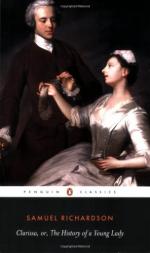You will, perhaps, laugh at me for these serious reflections. Do, if you will. I had rather you should laugh at me, for continuing in this way of thinking and acting, than triumph over me, as you threaten, on my swerving from purposes I have determined upon with such good reason, and induced and warned by such examples.
And so much for this subject at present.
I should be glad to know when you intend to set out. I have too much concern for your welfare, not to wish you in a thinner air and more certain climate.
What have Tourville and Mowbray to do, that they cannot set out with you? They will not covet my company, I dare say; and I shall not be able to endure theirs, when you are gone: take them, therefore, with you.
I will not, however, forswear making you a visit at Paris, at your return from Germany and Italy: but hardly with the hope of reclaiming you, if due reflection upon what I have set before you, and upon what you have written in your two last, will not by that time have done it.
I suppose I shall see you before you go. Once more I wish you were gone. This heavy island-air cannot do for you what that of the Continent will.
I do not think I ought to communicate with you, as I used to do, on this side the Channel: let me, then, hear from you on the opposite shore, and you shall command the pen, as you please; and, honestly, the power of
J. Belford.
LETTER XLI
Mr. Lovelace, to John Belford,
Esq.
Tuesday, Sept. 26.
Fate, I believe, in my conscience, spins threads for tragedies, on purpose for thee to weave with.—Thy Watford uncle, poor Belton, the fair inimitable, [exalted creature! and is she to be found in such a list!] the accursed woman, and Tomlinson, seemed to have been all doomed to give thee a theme for the dismal and the horrible;—and, by my soul, that thou dost work it going, as Lord M. would phrase it.
That’s the horrid thing, a man cannot begin to think, but causes for thought crowd in upon him; the gloomy takes place, and mirth and gaiety abandon his heard for ever!
Poor M’Donald!—I am really sorry for the fellow.—He was an useful, faithful, solemn varlet, who could act incomparably any part given him, and knew not what a blush was.—He really took honest pains for me in the last affair; which has cost him and me so dearly in reflection. Often gravelled, as we both were, yet was he never daunted.—Poor M’Donald! I must once more say:—for carrying on a solemn piece of roguery, he had no equal.
I was so solicitous to know if he were really as bad as thou hast a knack of painting every body whom thou singlest out to exercise thy murdering pen upon, that I dispatched a man and horse to Maidstone, as soon as I had thine; and had word brought me, that he died in two hours after he had received thy five guineas. And all thou wrotest of his concern, in relation to the ever-dear Miss Harlowe, it seems was true.




